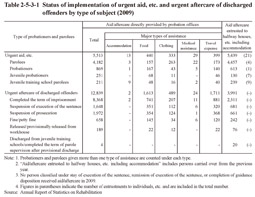Section 3 Urgent Aftercare of Discharged Offenders
1 Urgent aid, etc. and aftercare of discharged offenders
If the reformation/rehabilitation of a probationer/parolee could possibly be hindered by illness, injury, or a lack of a proper abode or employment, etc., a probation office can provide advice and adjustment in ensuring they receive the necessary support from welfare institutions, etc. If they cannot receive that support promptly enough or the support provided by such institutions is deemed insufficient, a probation office provides the probationers/parolees with urgent aid (urgent aid, etc.), which can include food, clothing, and travel expenses, or entrusting them to a halfway house.
Urgent aftercare of discharged offenders is a measure that is similar to urgent aid, etc. that can be provided, upon request, to those released on completion of their term of imprisonment, granted suspension of execution of the sentence without probation, granted suspension of prosecution, sentenced to fine or petty fine, released or provisionally released from a workhouse, or released or released on parole from a juvenile training school and completed their term of parole supervision. Urgent aftercare can be provided for a period of no longer than six months after the date of discharge from the physical constraint imposed by criminal proceedings or protective measures. This measure can also be taken for an additional period of no longer than six months if deemed particularly necessary in the rehabilitation of the offender concerned.
Table 2-5-3-1 shows the status of implementation of urgent aid, etc. and urgent aftercare of discharged offenders by type of subject in 2009.
Table 2-5-3-1 Status of implementation of urgent aid, etc. and urgent aftercare of discharged offenders by type of subject (2009)
